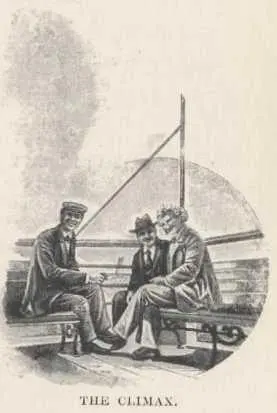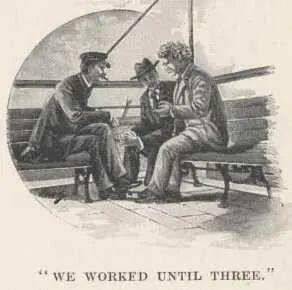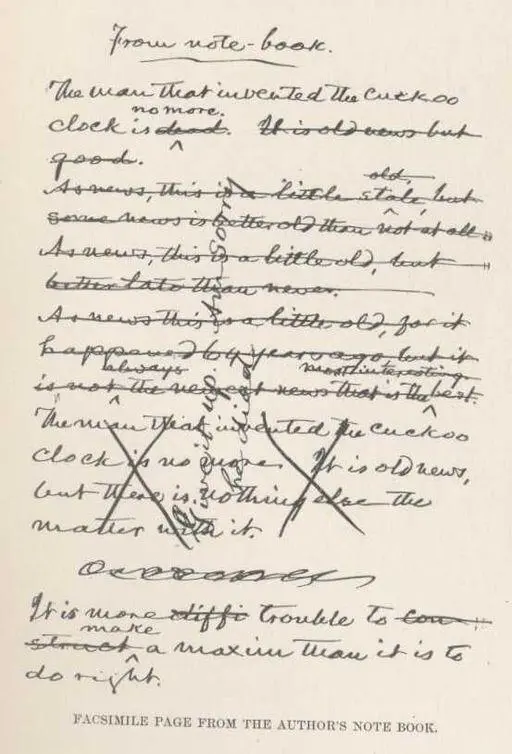Mark Twain - Following the Equator
Здесь есть возможность читать онлайн «Mark Twain - Following the Equator» весь текст электронной книги совершенно бесплатно (целиком полную версию без сокращений). В некоторых случаях можно слушать аудио, скачать через торрент в формате fb2 и присутствует краткое содержание. Год выпуска: 2004, Жанр: Классическая проза, Юмористическая проза, на английском языке. Описание произведения, (предисловие) а так же отзывы посетителей доступны на портале библиотеки ЛибКат.
- Название:Following the Equator
- Автор:
- Жанр:
- Год:2004
- ISBN:нет данных
- Рейтинг книги:3 / 5. Голосов: 1
-
Избранное:Добавить в избранное
- Отзывы:
-
Ваша оценка:
- 60
- 1
- 2
- 3
- 4
- 5
Following the Equator: краткое содержание, описание и аннотация
Предлагаем к чтению аннотацию, описание, краткое содержание или предисловие (зависит от того, что написал сам автор книги «Following the Equator»). Если вы не нашли необходимую информацию о книге — напишите в комментариях, мы постараемся отыскать её.
Following the Equator — читать онлайн бесплатно полную книгу (весь текст) целиком
Ниже представлен текст книги, разбитый по страницам. Система сохранения места последней прочитанной страницы, позволяет с удобством читать онлайн бесплатно книгу «Following the Equator», без необходимости каждый раз заново искать на чём Вы остановились. Поставьте закладку, и сможете в любой момент перейти на страницу, на которой закончили чтение.
Интервал:
Закладка:
Of course none but a happy ending of the story would be accepted by the jury; the finish must find Brown in high credit with the ladies, his behavior without blemish, his modesty unwounded, his character for self sacrifice maintained, the Old People rescued through him, their benefactor, all the party proud of him, happy in him, his praises on all their tongues.
We tried to arrange this, but it was beset with persistent and irreconcilable difficulties. We saw that Brown's shyness would not allow him to give up the lap-robe. This would offend Mary and her mother; and it would surprise the other ladies, partly because this stinginess toward the suffering Old People would be out of character with Brown, and partly because he was a special Providence and could not properly act so. If asked to explain his conduct, his shyness would not allow him to tell the truth, and lack of invention and practice would find him incapable of contriving a lie that would wash. We worked at the troublesome problem until three in the morning.
Meantime Mary was still reaching for the lap-robe. We gave it up, and decided to let her continue to reach. It is the reader's privilege to determine for himself how the thing came out.


CHAPTER III.
It is more trouble to make a maxim than it is to do right.
—Pudd'nhead Wilson's New Calendar.Honolulu—Reminiscences of the Sandwich Islands—King Liholiho and His Royal Equipment—The Tabu—The Population of the Island—A Kanaka Diver—Cholera at Honolulu—Honolulu; Past and Present—The Leper Colony

On the seventh day out we saw a dim vast bulk standing up out of the wastes of the Pacific and knew that that spectral promontory was Diamond Head, a piece of this world which I had not seen before for twenty-nine years. So we were nearing Honolulu, the capital city of the Sandwich Islands—those islands which to me were Paradise; a Paradise which I had been longing all those years to see again. Not any other thing in the world could have stirred me as the sight of that great rock did.
In the night we anchored a mile from shore. Through my port I could see the twinkling lights of Honolulu and the dark bulk of the mountain-range that stretched away right and left. I could not make out the beautiful Nuuana valley, but I knew where it lay, and remembered how it used to look in the old times. We used to ride up it on horseback in those days—we young people—and branch off and gather bones in a sandy region where one of the first Kamehameha's battles was fought. He was a remarkable man, for a king; and he was also a remarkable man for a savage. He was a mere kinglet and of little or no consequence at the time of Captain Cook's arrival in 1788; but about four years afterward he conceived the idea of enlarging his sphere of influence. That is a courteous modern phrase which means robbing your neighbor—for your neighbor's benefit; and the great theater of its benevolences is Africa. Kamehameha went to war, and in the course of ten years he whipped out all the other kings and made himself master of every one of the nine or ten islands that form the group. But he did more than that. He bought ships, freighted them with sandal wood and other native products, and sent them as far as South America and China; he sold to his savages the foreign stuffs and tools and utensils which came back in these ships, and started the march of civilization. It is doubtful if the match to this extraordinary thing is to be found in the history of any other savage. Savages are eager to learn from the white man any new way to kill each other, but it is not their habit to seize with avidity and apply with energy the larger and nobler ideas which he offers them. The details of Kamehameha's history show that he was always hospitably ready to examine the white man's ideas, and that he exercised a tidy discrimination in making his selections from the samples placed on view.
A shrewder discrimination than was exhibited by his son and successor, Liholiho, I think. Liholiho could have qualified as a reformer, perhaps, but as a king he was a mistake. A mistake because he tried to be both king and reformer. This is mixing fire and gunpowder together. A king has no proper business with reforming. His best policy is to keep things as they are; and if he can't do that, he ought to try to make them worse than they are. This is not guesswork; I have thought over this matter a good deal, so that if I should ever have a chance to become a king I would know how to conduct the business in the best way.
When Liholiho succeeded his father he found himself possessed of an equipment of royal tools and safeguards which a wiser king would have known how to husband, and judiciously employ, and make profitable. The entire country was under the one scepter, and his was that scepter. There was an Established Church, and he was the head of it. There was a Standing Army, and he was the head of that; an Army of 114 privates under command of 27 Generals and a Field Marshal. There was a proud and ancient Hereditary Nobility. There was still one other asset. This was the tabu—an agent endowed with a mysterious and stupendous power, an agent not found among the properties of any European monarch, a tool of inestimable value in the business. Liholiho was headmaster of the tabu. The tabu was the most ingenious and effective of all the inventions that has ever been devised for keeping a people's privileges satisfactorily restricted.
It required the sexes to live in separate houses. It did not allow people to eat in either house; they must eat in another place. It did not allow a man's woman-folk to enter his house. It did not allow the sexes to eat together; the men must eat first, and the women must wait on them. Then the women could eat what was left—if anything was left—and wait on themselves. I mean, if anything of a coarse or unpalatable sort was left, the women could have it. But not the good things, the fine things, the choice things, such as pork, poultry, bananas, cocoanuts, the choicer varieties of fish, and so on. By the tabu, all these were sacred to the men; the women spent their lives longing for them and wondering what they might taste like; and they died without finding out.
These rules, as you see, were quite simple and clear. It was easy to remember them; and useful. For the penalty for infringing any rule in the whole list was death. Those women easily learned to put up with shark and taro and dog for a diet when the other things were so expensive.
It was death for any one to walk upon tabu'd ground; or defile a tabu'd thing with his touch; or fail in due servility to a chief; or step upon the king's shadow. The nobles and the King and the priests were always suspending little rags here and there and yonder, to give notice to the people that the decorated spot or thing was tabu, and death lurking near. The struggle for life was difficult and chancy in the islands in those days.

Thus advantageously was the new king situated. Will it be believed that the first thing he did was to destroy his Established Church, root and branch? He did indeed do that. To state the case figuratively, he was a prosperous sailor who burnt his ship and took to a raft. This Church was a horrid thing. It heavily oppressed the people; it kept them always trembling in the gloom of mysterious threatenings; it slaughtered them in sacrifice before its grotesque idols of wood and stone; it cowed them, it terrorized them, it made them slaves to its priests, and through the priests to the king. It was the best friend a king could have, and the most dependable. To a professional reformer who should annihilate so frightful and so devastating a power as this Church, reverence and praise would be due; but to a king who should do it, could properly be due nothing but reproach; reproach softened by sorrow; sorrow for his unfitness for his position.
Читать дальшеИнтервал:
Закладка:
Похожие книги на «Following the Equator»
Представляем Вашему вниманию похожие книги на «Following the Equator» списком для выбора. Мы отобрали схожую по названию и смыслу литературу в надежде предоставить читателям больше вариантов отыскать новые, интересные, ещё непрочитанные произведения.
Обсуждение, отзывы о книге «Following the Equator» и просто собственные мнения читателей. Оставьте ваши комментарии, напишите, что Вы думаете о произведении, его смысле или главных героях. Укажите что конкретно понравилось, а что нет, и почему Вы так считаете.











